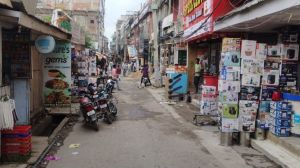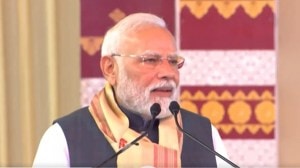From Istanbul, a Visitor to Akbar’s Court
What brings you to India?My Name is Red has a little mention of the court of Akbar in its discourse on impact of Islam and Western painting ...

What brings you to India?
My Name is Red has a little mention of the court of Akbar in its discourse on impact of Islam and Western painting on Ottoman painting. Istanbul’s courtly painting was dying. I made a brief reference to Akbar’s court but I knew there was more to be known about the painting of that period. Another reason I am here is for research for my next book.
What is it about?
It is about collectors. People who are obsessed with collecting something. It could be anything from Coca Cola bottle caps to casks. I travelled in many towns in India too. Mumbai, Hyderabad, Calcutta, Chennai, Madurai, Agra, Jaipur, Delhi.
Your latest book Snow created a storm upon publication.
Snow is set in Kars in northeast Turkey, which is a Kurdish majority area, against the backdrop of the presence of the Turkish army. It is a political novel in that it is deliberately political. Maybe in all my novels there is something political. But this one is on purpose. I am not a very political person but evolved into one. This one is based on people who are doing politics. There was anger in Turkey because in every country there are two schools of political opinion. Here Kurdish nationalists wants their side to be talked about. There is a conflict between secularists and Islamists in Turkey and the book got caught in that. Secularists want Islamists to be represented in a bad way while Islamists are hurt, for the book does not strictly follow their version of things. For instance, they are angry that an unmarried woman has sex! I can’t help it. I am a novelist, not a propagandist. I care about beauty hidden in the human side of all these situations, for the human music of the story.
Snow is being published in India in April. My last book, however, is Istanbul which is yet to be translated. It is partly an autobiographical essay about Istanbul. How certain western travellers like Flaubert came there and wrote about it and how it influenced certain central writers there… how they developed their sense of the city. It is also about how a certain person, who happens to be me, perceives spaces, landscapes in family structures as westernised or Islamic. It is about how the westernised elite in Istanbul dealt with Islam, the westernised exteriors and the Islamic core.
How do you deal with the conflict of being westernised and a Muslim?
I am also a westernised elite. It comes from Kemal Ataturk since the 1920s when he went on a programme of westernising the country. This conflict is also a political thing as the attempt of the elite to westernise made the tension between the two a central focus. There is a constant inner monologue on this, a constant preoccupation of being east or west. This became the spirit of the nation. I saw the country had two souls, but never felt it was bad. I feel that boundaries of the human spirit are not clear. We may have it hiding in ourselves plural voices and spirits. It can be seen as a rich thing rather than as a disadvantage. All in Turkey accept dual identities, but some want all to be symmetric and organised. My reaction is: Don’t panic. It is good the way it is. Don’t impose one thing on the other. Let the two co-exist. Don’t exaggerate the differences.
In The White Castle a Venetian painter finds a twin in a look alike and until the end it is not clear who is the survivor. This plurality within the self seems to be projected.
Yes, very much so. It is the doppelganger explored by Borges and Dostoevsky. Now I learn that Hindu mythology is full of that. One person having been someone else in the previous incarnation.
Your books, especially The Black Book, have discourses on the “endless war of the twins”, east and west.
That has to do with Turkish history. After the decline of the Ottoman empire there was a desire to improve it militarily, as well as in other fields like mathematics, philosophy, arts… My Name Is Red has the emperor looking westwards for a style of painting. Later in the 1920s the government tried to westernise the country from above. So there was resistance to it. This conflict has defined the country, but in Turkey the most important feature of this passion among the elite to westernise was that the ruling elite tended to look down upon religion. The elite’s problematic relationship with Islam has been a key feature of the nation. It felt that it was an obstacle for modernism. In the ’50s and ’60s the elite treated Islam as popular low culture, which paved the way for political Islam.
Your books also constantly refer to the past as “that golden age”. There is a sense of loss…
I have always felt that Istanbul was once a centre of the world, a major player in world history, one of the glorious capitals… but now is only a provincial forgotten past of the world. The remains of Ottoman buildings, the ruins in the back streets left their marks on my spirit. In fact I felt something like that while in Calcutta.
Photos



- 01
- 02
- 03
- 04
- 05




























